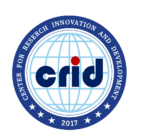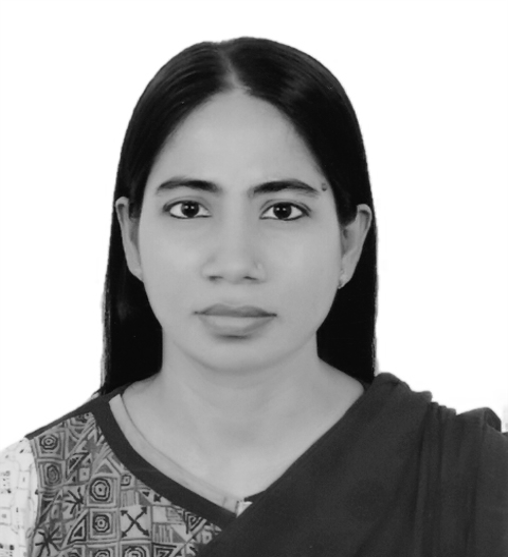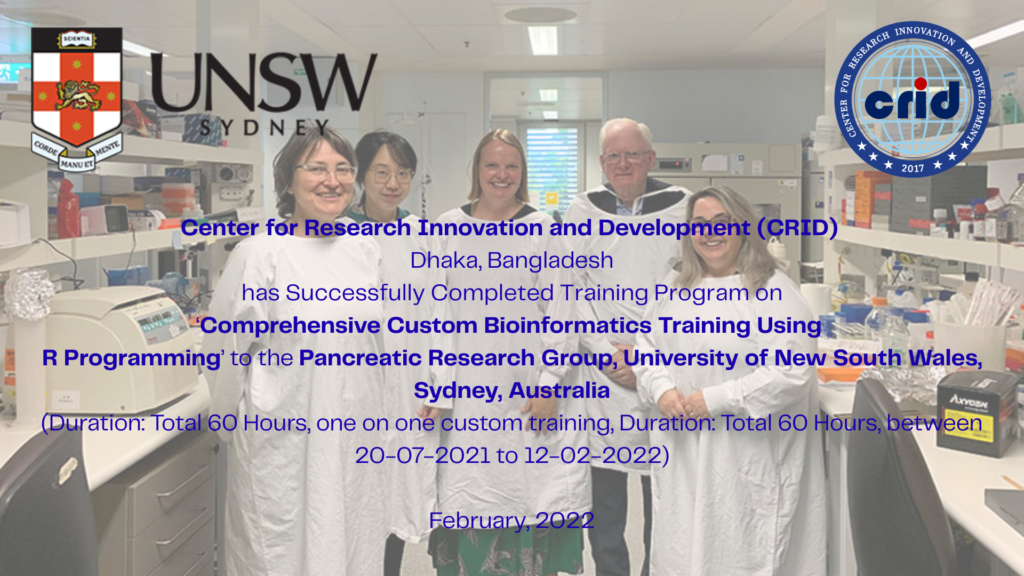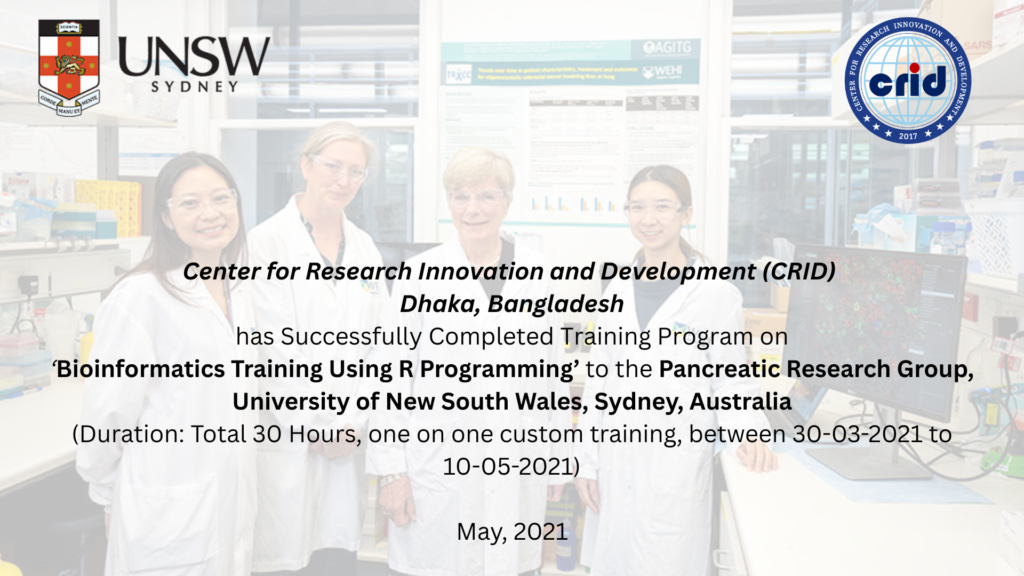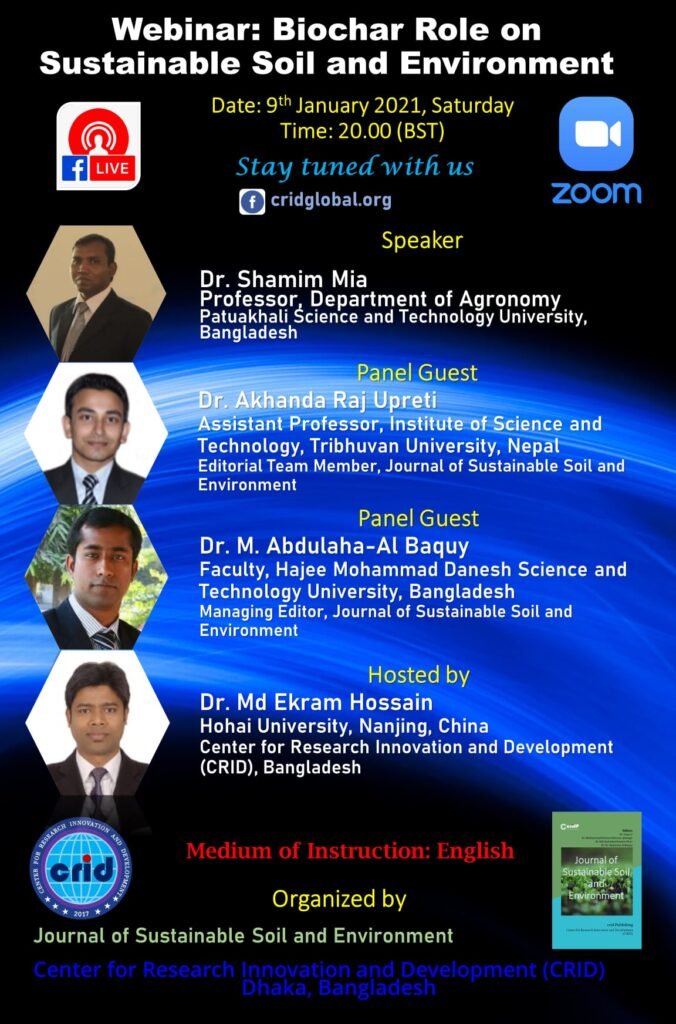CRID Bioinformatics Research Lab
Integrating biology, data science, and innovation to solve real-world challenges
The Lab
The Bioinformatics Research Lab is a dedicated research and training unit under the Center for Research Innovation and Development (CRID), based in Dhaka, Bangladesh. It serves as a hub for advancing bioinformatics research and capacity building, with a strong focus on engaging young minds in scientific discovery.
The lab is committed to nurturing the next generation of researchers and scientists by providing hands-on training, mentorship, and opportunities to participate in collaborative projects. Through exposure to cutting-edge computational tools and analytical techniques, students and early-career professionals are empowered to explore complex biological questions and data-driven challenges.
Research at the lab spans diverse areas including genomics, computational biology, systems biology, and molecular data analysis. By bridging theoretical knowledge with practical applications, the lab contributes to real-world solutions in healthcare, agriculture, and environmental science. This applied focus aligns with national development priorities and global sustainable development goals.
In addition to research, the lab plays a crucial role in fostering a culture of inquiry, innovation, and interdisciplinary collaboration. It actively collaborates with universities, research institutions, and industry partners to expand its reach and impact. The lab also organizes workshops, training programs, and academic events to strengthen bioinformatics capacity across Bangladesh and beyond.
Through its programs and partnerships, the CRID Bioinformatics Research Lab supports CRID’s broader mission to promote impactful, multidisciplinary research that addresses pressing societal challenges and builds a future grounded in knowledge and scientific excellence.
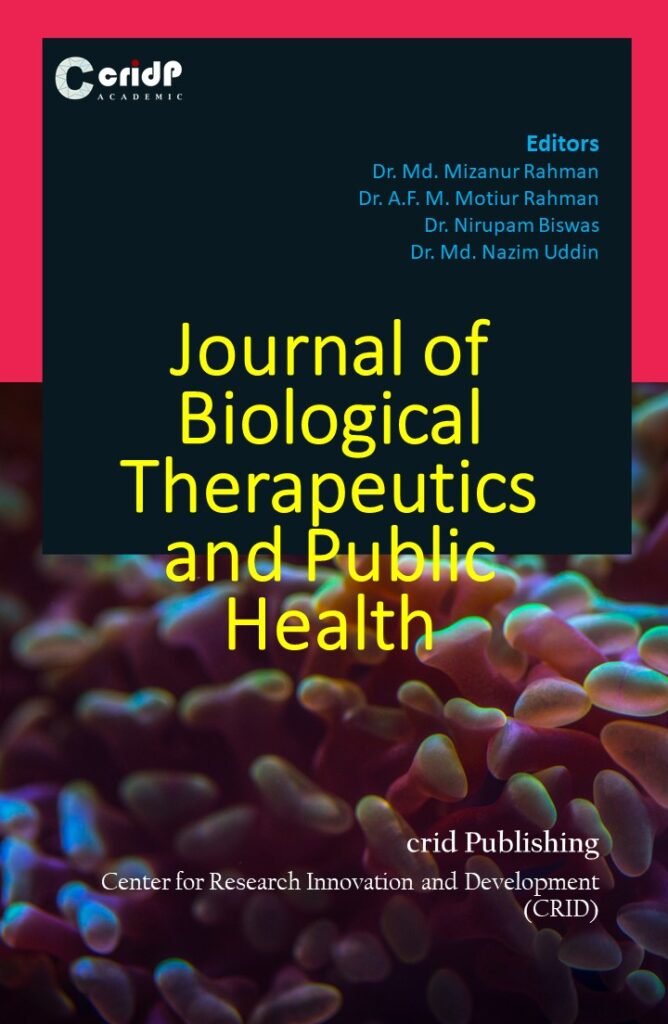
Driving Innovation at the Intersection of Life Sciences, Data, and Technology
Genomics and Transcriptomics
Whole-genome and transcriptome sequencing for humans, plants, and microbes
SNP and structural variant analysis for population and evolutionary studies
Gene expression profiling using RNA-Seq and transcript annotation
Functional genomics to understand gene regulation and biological pathways
Proteomics and Metabolomics
Protein structure prediction and domain analysis using in silico tools
Mass spectrometry data processing for protein identification and quantification
Metabolomic profiling to study disease biomarkers and metabolic pathways
Integration of proteomics with genomics for systems-level understanding
AI and Machine Learning in Bioinformatics
Development of deep learning models for genomics and medical imaging
AI-powered diagnostics and classification of diseases (e.g., cancer, diabetes)
Predictive analytics for drug response, disease risk, and gene function
Natural language processing for mining biomedical literature and databases
Precision Medicine and Health Informatics
Identification of disease-specific mutations for personalized therapies
Pharmacogenomic profiling to guide drug selection and dosage
Development of digital health tools for genomic decision support
Integration of clinical and genomic data for risk assessment and treatment
Database Development and Bioinformatics Tools
Creation of local biological databases (e.g., crops, diseases, genomes)
Development of custom bioinformatics pipelines and analysis tools
User-friendly software and web platforms for researchers and students
Integration of visualization tools for omics data interpretation
Ethics, Data Policy & Open Science
Development of ethical guidelines for genomic and clinical data use
Implementation of data privacy and consent frameworks
Advocacy of FAIR data principles (Findable, Accessible, Interoperable, Reusable)
Promotion of open-source tools, knowledge sharing, and citizen science
Advisors
Our Team
Project 1
Cancer-Associated StromalFibroblast-Derived TranscriptomesPredict Poor Clinical Outcomes andImmunosuppression in Colon Cancer
Upcoming Projects
Project 1: Multi-Omics Approach to Early Cancer Detection
Integrating genomics, proteomics, and metabolomics to identify early-stage cancer biomarkers.
Project 2: AI-Powered Prediction of Non-Communicable Diseases (NCDs)
Developing machine learning models to predict disease risk using population genomics.

Project 3: Bioinformatics Pipeline for Indigenous Crop Improvement
Designing computational tools to identify stress-tolerant genes in local crops.
Project 4: Pharmacogenomic Mapping of the Bangladeshi Population
Studying gene-drug interactions to support personalized medicine initiatives.
Capacity Building
Events
Conference
His having within saw become ask passed misery giving. Recommend questions get too fulfilled. He fact in we case miss sake. Entrance be throwing.
Seminars
His having within saw become ask passed misery giving. Recommend questions get too fulfilled. He fact in we case miss sake. Entrance be throwing.
Training Program
His having within saw become ask passed misery giving. Recommend questions get too fulfilled. He fact in we case miss sake. Entrance be throwing.
Workshop
His having within saw become ask passed misery giving. Recommend questions get too fulfilled. He fact in we case miss sake. Entrance be throwing.
February 13, 2022
Comprehensive Custom Bioinformatics Training Using R Programming
The Bio Informatics Research Lab of the Center for Research Innovation and Development (CRID), Dhaka, Bangladesh successfully completed a specialized program titled Comprehensive Custom Bioinformatics Training Using R Programming for the Pancreatic Research Group, University of New South Wales (UNSW), Sydney, Australia. Delivered as an intensive, personalized one-on-one training between 20 July 2021 and 12 February 2022, the program covered a total of 60 hours of structured learning focused on advanced bioinformatics techniques, R-based analytical skills, and research-oriented data interpretation. This initiative significantly enhanced the group’s capacity for high-impact biomedical and cancer research while strengthening international research collaboration between CRID and UNSW. (February 2022)
MAy 11, 2021
Bioinformatics Training Using R Programming for the Pancreatic Research Group, University of New South Wales (UNSW), Sydney, Australia
The Bio Informatics Research Lab of the Center for Research Innovation and Development (CRID), Dhaka, Bangladesh successfully completed a specialized training program titled Bioinformatics Training Using R Programming for the Pancreatic Research Group, University of New South Wales (UNSW), Sydney, Australia. Conducted between 30 March 2021 and 10 May 2021, the program delivered a total of 30 hours of intensive, customized one-on-one training focused on practical bioinformatics data analysis skills using R, with emphasis on research applications relevant to cancer and genomic studies. This capacity-building initiative strengthened analytical competence, enhanced research efficiency, and contributed to advancing high-quality biomedical research collaboration between CRID and UNSW. (May 2021)
January 09, 2021
Webinar on “Biochar Role on Sustainable Soil and Environment”
Our Global Collaborations
Partnering Across Borders to Drive Innovation, Research, and Sustainable Development
Gallery
A visual journey of innovation, impact, and community engagement






Associates
Contact
CRID Bioinformatics Research Lab
Email: contact@cridglobal.org
Phone No. +8801866208151
Collaborative Research?
Fostering Strategic Partnerships for Impactful Research, Publication and Sustainable Innovation
